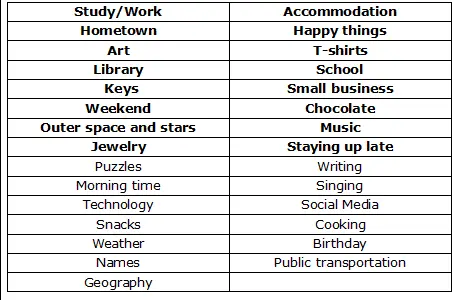南昌朗阁2023年3月25日雅思考试回顾
作者:jasmine老师来源:longre时间:2023-03-28 14:40:50
摘要:雅思考试
2023年3月25日雅思考试口语回顾
Part1题目汇总(加粗题为高频题)

Part2 题目汇总(加粗题为高频题)
人物类:
Describe an actor or actress whom you admire.
Describe a person you have met who you want to work/study with.
Describe an interesting old person you met.
Describe a person you met at a party who you enjoyed talking with.
Describe a person who likes to dress fashionably.
Describe a person you know who loves to grow plants.
Describe a person you know who is from a different culture.
Describe a friend from childhood.
Describe a person who inspired you to do something interesting.
地点类:
Describe another city you would like to stay for a short time.
Describe a noisy place you have been to.
Describe a place you visited where the air was polluted.
Describe a new development in the area where you live (shopping mall, park …).
Describe your favorite place in your house where you can relax.
Describe a popular place for sports that you’ve been to.
Describe the home of someone you know well and often visit.
Describe a place in your country that you would like to recommend to visitors/tourists.
物品类:
Describe a piece of good news that you heard about someone you know well.
Describe a website you often visit.
Describe a piece of technology that you feel difficult to use.
Describe a historical period you would like to know more.
Describe an advertisement you don’t like.
Describe something you would like to learn in the future.
Describe a program you like to watch.
Describe a photo you took that you are proud of.
Describe an object that you think is beautiful.
Describe a story or novel you have heard about that you found interesting.
Describe a movie you watched recently and would like to watch again.
Describe an important thing you learned (not at school or college).
事件类:
Describe a time when someone gave you something that you really wanted.
Describe a time when you made a complaint and were satisfied with the result.
Describe your daily routine that you enjoy.
Describe something you did that made you feel proud.
Describe a time when you missed or were late for a meeting.
Describe an activity you enjoyed in your free time when you were young.
Describe a time when you taught a friend/relative something.
Describe the first day you went to school that you remember.
Describe something that you did with someone/a group of people.
Describe an unusual meal you had.
Describe a problem you had while shopping online or in a store.
Describe a time when you made a decision to wait for something.
Describe a time when you forgot/missed an appointment.
Describe a time you shared something with others.
Describe an outdoor activity you did in a new place recently.
Describe a disagreement you had with someone.
Describe a time when you saw a lot of plastic wastes.
Describe an impressive English lesson you had and enjoyed.
Describe a time when you needed to search for information.
Describe a time when you received money as a gift.
Describe a time when you over came difficulties in doing something and succeeded.
Describe a time you received positive feedback.
朗阁讲师房汐点评
Part1:
*部分话题新话题chocolate难度稍微有点大,大家对于吃喝系列的话题比较没有内容去说,比如Do you like chocolate?可以这样回答:no currently I quit sugar, it is said that sugar can accelerate your aging process(加速衰老过程),but I used to have a sweet tooth(口语俚语:喜欢甜点)was my favorite.这样分开论述以前喜欢,展示过去式时态的灵活应用,用现在时态展示现在不喜欢了的表达,从而加强对于语法要求的掌握能力。
Part2:
第二部分更新了许多地点类话题,比如noisy place给很多学生造成困扰,觉得没有什么内容可以说:Noisy places are locations that are filled with loud, disruptive sounds that can be uncomfortable or even harmful to our ears. They can be found in various environments such as urban areas, construction sites, and of course, concert venues, while noisy places can be exciting and entertaining. It's important to be aware of the potential risks and to take necessary precautions to protect our hearing and overall well-being.
考试建议
总体来说,口语题库是固定的,所以只要准备充分,你见到外国人就不会紧张,因为你都做到心中有数了,所以积累口语素材是非常必要的,如果认为只靠上课听讲,而课下抽不出时间准备素材或者偷懒只准备几个素材,而不是全部都整理一遍的话,那你的口语练习是无效的哦。
2023年3月25日雅思考试听力回顾
场景话题:
P1 课程预订/ P2 自行车比赛/ P3 网络课程选课的讨论/ P4 *语的起源
题型设置:
P1填空(新题)/ P2地图+配对(旧题) / P3配对+多选(旧题)/ P4 填空(旧题)
朗阁讲师李笑笑点评
本次考试场景为三旧一新,整体难度较大。
填空题具体答案如下:(仅供参考)
P1:(部分)
1. 24 August
2. single
3. Russia
4. writing
5. 7.55
6. 150
P2:
11. Rocks: B
12. Forest: E
13. Factory: F
14. Natural reserve: G
15-20
15. C. there may be animals in the way
16. C. re-opened recently
17. A. You can hire a bike
18. B. during the weekends
19. A. takes a long time
20. B. station website
P3:
21. Birmingham: E. objective
22. Manchester: B. budget
23. Liverpool: G. team building
24. Leeds: F. leaders’ skill
25. Glasgow: H. monitoring system
26. Cardiff: A. program assessment
27-28. What are the purposes of designing the gas generators
C. Environment D. insufficient revenue
29-30. what is the significance for the new greenhouse?
B. increase nutrition C. more children will have an education
P4:
31. trade
32. science
33. picture
34. numbers
35. songs
36. letter
37. negative
38. hospital
39. emotions
40. writers
点评:本场考试整体难度较大,不少同学表示又是给BC送考试费的一天。今天整场考试中考试题型变化较多,地图题多选题等已经连着两周同时出现,在这里也建议大家在关注预测的同时也要做到对每种题型的全面复习,知己知彼才能百战百胜。今天的地图题应该算是整场考试中偏难部分,不少同学反应脑子跟不上地图方位的转换,在这里建议大家在平时练习时要对做听写练习,尤其是对地图题的相关方位词汇,一定要熟练敏感,多听多练。参考剑桥练习:剑12Test8S2,剑16Test1S2,剑9Test2S2等。
备注:在接下来的备考中,地图题仍然是重中之重,在练习时大家需要多去积累常见的同义替换,在把握定位的同时*词汇的转换,多关注方位信息词。在练习听力的过程中,由于p2/3的难度有所*,注意可以适当加快音频的播放速度,平时练习时可加至1.25-1.5倍速练习。填空题部分强调对单复数的辨析听写练习,注意连读/吞音等特殊发音现象。
考试建议
1. 场景方面:场景方面依旧是主流场景(咨询、参观、课程讨论、学科讲座),在接下来的考试中,考生还应将重点放在P1旅游,P2场地介绍,活动介绍,P3课程讨论及论文写作,P4动植物,环境,历史,*等各类*讲座。
2. 机经:如需参考机经,以2019-2021年机经为主。
2023年3月25日雅思考试写作回顾
小作文:地图 英国一村庄在2000年到现在的布局变化
大作文:Some people think watching television every day is bad for children. Others think it is good for developing children as they grow up. Discuss both views and give your opinion.
朗阁讲师王艳点评
1.本次考试 难度较低
2.整体分析:
Task 1:地图题
注意:
1、本次小作文难度中等,考的是英国一村庄在2000年到现在的布局变化
2、在进行描述的过程中,同学们需要充分注意时态:如果地图题反映的是⼀个地⽅在过去的⼀段时间的变化,⽂章⽤⼀般过去时;如果地图题反映的是⼀个地⽅在将来⼀段时间的变化趋势,⽂章⽤表“估计”的词汇; 如果地图题反映的是⼀个地⽅从过去到现在的变化,可⽤现在完成时。
3、地图题描述的是⼀个地区的变化,那么“变化”词汇必须过关。变化包括两种:图形原有事物的改变,图形新添事物。
Task 2 :教育话题,比较简单。上一次考这个题目是2022年12月3号。
题目翻译:有些人认为每天看电视对*不好。其他人则认为这对*成长过程中的发展有好处。讨论两种观点并给出你自己的观点。
看电视对于*的弊端,有很多角度可以写。有的同学可能会从身体方面来写,比如久坐不动sedentary lifestyle,缺乏锻炼,损害视力damage the eyesight。也可以从人际沟通能力的角度去写,因为把时间用来看电视,减少了与人交流的时间socialize with their peers,使*变得孤僻prefer solitude and avoid social interaction,become isolated,不懂得与人交往,影响到社交技能和情商social skills and emotional quotient。此外,看电视是被动地接受信息accept what they see on TV passively,*可能会缺乏独立思考的能力lack the ability to think independently,而且想象力容易受到限制be restricted in their imagination,因为所有的画面都被呈现在他们面前be presented before them。还可以从电视内容的角度来写,比如有些电视节目含有暴力内容contain the elements of violence,某些*看了这些节目可能会出现行为问题show behavior problems,比如模仿电视里面的英雄人物imitate what they learn from the programs and get into fights with others,使用暴力解决问题等use violence to solve disputes in their lives
另一方的观点认为,看电视对*有好处,电视节目里面有很多是具有教育意义的educational,informative,*能够获得很多知识acquire knowledge in various subjects,包括历史、科学、文化等等。看电视也能帮助*了解社会understand society,很多*喜欢看动画片,这些动画片都是改编自*文学作品be adapted from children’s literature,能教会*很多社会和生活方面的知识。看电视还能够**的语言能力,他们能够积累很多词汇enlarge their vocabulary,**对于语言的理解能力enhance their ability to comprehend the language,因为他们需要看懂剧情follow the plot,理解人物的对话understand the dialogue。
考试建议
1.小作文:柱图等数据图仍然需要格外关注;流程图和地图也需要适当学习;
大作文:社会类考题仍然是关注的重点;其中科技和社会生活类话题需要多留意;
2023年3月25日雅思考试阅读回顾
P1 科学研究
P2 澳大利亚原住民
P3 Multitasking Debate
朗阁讲师徐露露点评
1. 本场阅读难度系数前俩篇算是正常难度,第三篇难度较高,但是第三篇为老题重复了22年8月6号的雅思阅读机经。从题型搭配上来看也是属于主流题型的常规搭配方式,比如判断+填空,段落细节配对+单选+判断,考生们灵活的应用顺序做题以及平行做题俩种策略即可。
2. 整体分析:涉及科学类(P1)、社会类(P2)、心理学(P3)。
3. 部分答案及参考文章:
Passage 1:科学研究
难易度:话题难度中等
题型:判断+填空
Passage 2: 澳大利亚原住民
难易度:中等
题型:待回忆
Passage 3:Multitasking Debate
难易度:较难
题型:匹配+选择+判断
28-32 段落信息匹配
28.F
29.I
30.C
31.B
32.G
33-35 单选
33.C
34.B
35.A
36-40 判断
36.YES
38.NO
39.NOT GIVEN
40.NO
Multitasking Debate
Can you do them at the same time?
A. Talking on the phone while driving isn't the only situation where we're worse at multitasking than we might like to think we are. New studies have identified a bottleneck in our brains that some say means we are fundamentally incapable of true multitasking. If experimental findings reflect real-world performance, people who think they are multitasking, are probably just under performing in all- or at best, all but one - of their parall pursuits. Practice might improve your performance, but you will never be as good as when focusing on one task at a time.
B. The problem, according to Rene Marois, a psychologist at Vanderbilt University in Nashville, Tennessee, is that there's a sticking point in the brain. To demonstrate this, Marois devised an experiment to locate it Volunteers watch a screen and when a particular image appears, a red circle, say, they have to press a key with their index finger. Different coloured circles require presses from different fingers. Typical response time is about half a second, and the volunteers quickly reached their peak performance. Then they learn to listen to different recordings and respond by making a specific sound. For instance, when they hear a bird chirp, they have to say "ba"; an electronic sound should elicit a "ko", and so on. Again,no problem. A normal person can do that in about half a second, with almost no effort.
C. The trouble comes when Marois shows the volunteers an image, and then almost immediately plays them a sound. Now they'e flummoxed." If you show an image and play a sound at the same time, one task is postponed," he says. In fact, if the second task is introduced within the half. second or so it takes to process and react to the first, it will simply be delayed until the first one is done. The largest dual task delays occur when the two tasks are presented simultaneously; delays progressively shorten as the interval between presenting the tasks lengthens.
D. There are at least three points where we seem to get stuck, says Marois. The first is in simply identifying what we're looking at. This can take a few tenths of a second, during
which time we are not able to see and recognize the second item. This limitation is known as the "attentional blink*: experiments have shown that if you're watching out for a particular event and a second one shows up unexpectedly any time within this crucial window of concentration, it may register in your visual cortex but you will be unable to act upon it. Interestingly, if you don't expect the first event, you have no trouble responding to the second. What exactly causes the attentional blink is still a matter for debate.
E. A second limitation is in our short-term visual memory. It's estimated that we can keep track of about four items at a time, fewer if they are complex. This capacity shortage is thought to explain, in part, our astonishing inability to detect even huge changes in scenes that are otherwise identical, so-called "change blindness". Show people pairs of near-identical photos - say, aircraft engines in one picture have disappeared in the other - and they will fail to spot the differences. Here again, though, there is disagreement about what the essential limiting factor really is. Does it come down to a dearth of storage capacity, or is it about how much attention a viewer is paying?
F. A third limitation is that choosing a response to a stimulus - braking when you see a child in the road, for instance, or replying when your mother tells you over the phone that she' s thinking of leaving your dad - also takes brainpower. Selecting a response to one of these things will delay by some tenths of a second your ability to respond to the other. This is called the "response selection bottleneck theory, first proposed in 1952.
G. But David Meyer, a psychologist at the University of Michigan, Ann Arbor, don't buy the bottleneck idea. He thinks dual-task interference is just evidence of a strategy used by the brain to prioritise multiple activities. Meyer is known as something of an optimist by his peers. He has written papers with titles like "Virtually perfect time- sharing in dual-task performance: Uncorking the central cognitive bottleneck. His experiments have shown that with enough practice - at least 2000 tries - some people can execute two tasks simultaneously as competently as if they were doing them one after the other. He suggests that there is a central cognitive processor that coordinates all this and, what's more, he thinks it uses discretion sometimes it chooses to delay one task while completing another.
H. Marois agrees that practice can sometimes erase interference effects. He has found that with just 1 hour of practice each day for two weeks, volunteers show a huge improvement at managing both his tasks at once. Where he disagrees with Meyer is in what the brain is doing to achieve this. Marois speculates that practice might give us the chance to find less congested circuits to execute a task - rather like finding trusty back streets to avoid heavy traffic on main roads - effectively making our response to the task subconscious. After all, there are plenty of examples of subconscious multitasking that most of us routinely manage: walking and talking, eating and reading, watching TV and folding the laundry.
I. It probably comes as no surprise that, generally speaking, we get worse at multitasking as we age. According to Art Kramer at the University of llinois at Urbana- Champaign, who studies how ageing affects our cognitive abilities, we speak in our 20s. Though the decline precipitous. In one study, he and his colleagues had both young and old participants do a simulated driving task while carrying on a conversation. He found that while young drivers tended to miss background changes, older drivers failed to notice things that were highly
14-18为匹配题
14. A theory explained delay happens when selecting one reaction F
15. Different age group responds to important things differently I
16. Conflicts happened when visual and audio element emerge simultaneously C
17. An experiment designed to demonstrates the critical part of the brain for multitasking B
18. A viewpoint favours the optimistic side of multitasking performance G
19-21为选择题
19. Which one is correct about the experiment conducted by Rene Marois?
A participants performed poorly on the listening task solely
B. volunteers press a different key on different colour
C. participants need to use different fingers on the different coloured object
D. they did a better job on Mixed image and sound information
20. Which statement is correct about the first limitation of Marois's experiment?
A. attentional blink" takes about ten seconds
B. lag occurs if we concentrate on one object while the second one appears
C. we always have trouble in reaching the second one
D. the first limitation can be avoided by certain measure
21. Which one is NOT correct about Meyer's experiments and statements?
A. just after failure in several attempts can people execute dual-task
B. Practice can overcome dual-task interference
C. Meyer holds a diferent opinion on Marois's theory
D. an existing processor decides whether to delay another task or not
22-26为判断题
22. The longer gap between the two presenting tasks means a shorter delay toward the second one.YES
23. Incapable human memory cause people to sometimes miss the differences when presented with two similar images. YES
24. Marois has a different opinion on the claim that training removes the bottleneck effect. NO
25. Art Kramer proved there is a correlation between multitasking performance and genders. NOT GIVEN
26. The author doesn't believe that the effect of practice could bring any variation NO
考试建议
相对于二月份和三月份前两场来说本场的阅读难度终于下降了一些,不过由于现在评分会灵活根据题目的难度系数算分,所以难度的下降可能会让评分的容错率变低,所以不管怎样对于考生们的要求没有降低。
-
-

-
全真测评
入学测评 阶段测评
-
-
-

-
科学体系
智能词汇 专项题库
-
-
-

-
学习督导
全程监督 引导学习
-
-
-

-
品牌优势
教师护航 学习无忧
-
沪ICP备17003234号 版权所有:上海朗阁教育科技股份有限公司
总部地址:上海市黄浦区淮海中路222号力宝广场5楼
Copyright 2005 LONGRE EDUCATION GROUP All Rights Reserved

 400-088-7087
400-088-7087


